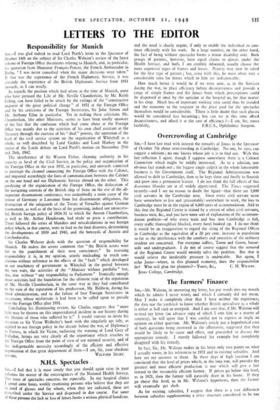Overcrowding at Cambridge
SIR,—I have just mad with interest the remarks of Janus in the Spectator of October 7th about overcrowding at Cambridge. No one, he says, can suggest a solution ; no one knows whose job it is to find one. With this last reflection I agree, though I suppose somewhere there is a Cabinet Committee which might be mildly interested. As to a solution, one obvious fact stands out ; the biggest single culprit in the whole lamentable business is the Government itself. The Regional Administration was allowed to drift to Cambridge, then to be kept there and finally to flourish and grow into a permanent feature. I do not think the full effects of this disastrous blunder are at all widely appreciated. The Times suggested recently—and I see no reason to doubt the figure—that there are 3,000 civil servants in the Cambridge area. Since every civil servant must have somewhere to live and (presumably) somewhere to work, the loss to Cambridge must be in the region of 6,000 units of accommodation. Add to this that the Regional Centre is visited by a stream of other civil servants, business men, &c., and you have some sort of explanation of the accommo- dation problem—of why every train and bus into Cambridge is full, every traffic thoroughfare blocked, every hotel booked up. I do not think it would be an exaggeration to regard the siting of the Regional Offices in Cambridge as the equivalent of a 20 per cent. increase in population so far as she interference with the comforts and amenities of the ordinary resident are concerned. For everyone suffers, Town and Gown, house- wife and undergraduate. I do not of course suggest that the removal of the Regional Centre would entirely solve the problem. But that it would relieve the intolerable pressure is undeniable. But again, I echo Janus—where, in this planned economy, does the responsibility
lie? Who will plan the planners?—Yours, &c., C. H. WILSON. lesus College, Cambridge.


































 Previous page
Previous page